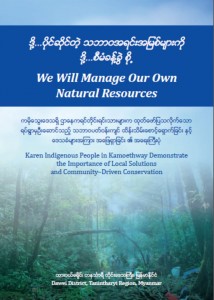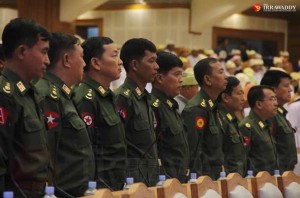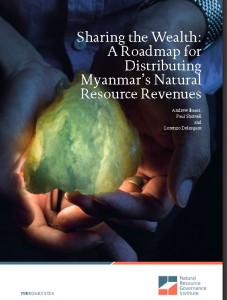Posts Tagged ‘Business and Human Rights’ (77 found)
Bottom-up, Community-driven Development Model Presents a Sustainable Future for Villagers and the Natural Environment in Tanintharyi Region
Rangoon – (24 March, 2016) – In a region bearing the brunt of top-down development and conservation policies and processes, local communities in Kamoethway River Valley, Tanintharyi Region have designed and are implementing their own, sustainable, locally-led development process, one that benefits both the natural environment and the indigenous people who have resided there for generations, Tenasserim River Indigenous People Network (TRIP-NET) outlined in a report launched today […]
• • •We Will Manage Our Own Natural Resources: Karen Indigenous People in Kamoethway Demonstrate the Importance of Local Solutions and Community–Driven Conservation
 This piece of community initiated action research reveals a number of lessons we can learn. The authors try to reflect the challenges of and opportunities for community based natural resources management in a seemingly forgotten Karen controlled area of southern Myanmar […]
This piece of community initiated action research reveals a number of lessons we can learn. The authors try to reflect the challenges of and opportunities for community based natural resources management in a seemingly forgotten Karen controlled area of southern Myanmar […]
Report of the Special Rapporteur on the situation of human rights in Myanmar
In the present report, submitted to the Human Rights Council pursuant to its resolution 28/23, the Special Rapporteur on the situation of human rights in Myanmar, Yanghee Lee, examines the developments in Myanmar since her reports to the Council, in March 2015 (A/HRC/28/72) and to the General Assembly, in October 2015 (A/70/412) […]
• • •Statement of Karenni Civil Society Organizations on International Rivers Day
In January 2010, Burma’s previous military government signed an MOU with China’s Datangcompany to build three hydropower dams in Karenni state […]
• • •Statement on International Action for Rivers Day
The Save the Salween Network is holding an event to mark the International Action for Rivers Day on the Salween River at Wan Sala village, Mong Ton township, at the border of Southern Shan State and Eastern Shan State, in collaboration with local communities, including children, youth, women, elders, religious leaders, leaders of the Shan Culture and Literature Association, Shan political party representatives and Community Based Organizations from across Burma, including from Shan, Karenni, Karen and Mon areas. […]
• • •NLD-led Government has Legitimacy but Lacks Power to Pursue Reforms?
 Last week in the newly-constituted and reinvigorated Parliament, National League for Democracy (NLD) lawmaker Khin San Hlaing tabled an emergency motion requesting an inquiry into the questionable nature and circumstances of business deals involving the sale of national assets and resources by the outgoing Government allegedly without proper safeguards or due process […]
Last week in the newly-constituted and reinvigorated Parliament, National League for Democracy (NLD) lawmaker Khin San Hlaing tabled an emergency motion requesting an inquiry into the questionable nature and circumstances of business deals involving the sale of national assets and resources by the outgoing Government allegedly without proper safeguards or due process […]
Statement of Kachin people on “Natural Resource Governance in Kachin State”
On March 1, 2016, 103 leaders of Kachin State from 61 organizations from civil society organizations, political parties, and religion organizations met at Myitkyina, Kachin State to discuss “Natural Resource Governance in Kachin State”. The following statements were agreed collectively at the forum […]
• • •Gold Mining Companies Try to Buy Silence of Villagers Impacted by Toxic Waste in eastern Shan State
The Shan State Farmers’ Network (SSFN) and the Shan Human Rights Foundation (SHRF) deplore renewed attempts by gold mining companies to buy the silence of villagers impacted by toxic mining waste in eastern Shan State, instead of responding to their demands to stop mining and restore their lands […]
• • •Save The Salween Network Statement
Plans to build dams on the Salween River, started by the previous military regime, have recently been accelerated by U Thein Sein’s government, which, on February 2, 2016, without informing or consulting Burma’s citizens, signed an agreement with China allowing implementation of 18 out of 29 hydropower dam projects planned by Chinese companies in Burma […]
• • •Sharing the Wealth: A Roadmap for Distributing Myanmar’s Natural Resource Revenues
 Oil, natural gas and mineral revenues are generated in nearly every state and region in Myanmar, with the most important onshore interests lying in Bago, Kachin, Magway, Mandalay, Sagaing, Shan and Tanintharyi. In these areas and others, extractive activities have significantly impacted livelihoods and the local environment […]
Oil, natural gas and mineral revenues are generated in nearly every state and region in Myanmar, with the most important onshore interests lying in Bago, Kachin, Magway, Mandalay, Sagaing, Shan and Tanintharyi. In these areas and others, extractive activities have significantly impacted livelihoods and the local environment […]









 All posts
All posts